

Apple picking is seriously under way and the picture is becoming clearer day by day.
Cox for long term store has been picked and Gala commenced this week. The weather has been kind and speaking to one grower friend, he told me his Bramley crop is 200 % of 2013 and 150% of his 12 year average. The Bramley sold for peeling (pies etc) is less than half the value of last year and when we consider 70% of Bramley is sold for proccessing; this will have an impact on profitability.
Gala is also coming off very heavy and he anticipates Breaburn will be heavy as well. The weather will accelerate the ripening process of the later varieties; e.g. Braeburn, Cameo, Jazz, Kanzi etc. Of course this does not guarantee a good year for the grower, as prices will be under pressure. My grower friend remarked; the consumer probably does not appreciate that the value of the fruit in a bag received by the grower, is only a relatively small percentage of the retail price payed by the consumer.
Over the next few weeks the variety and quantity of English Apples & Pears will steadily increase on retail shelves. Expect the first Cox in Supermarkets by W/C Monday 15th September and Gala by W/C 22nd September.
 Last week the 22nd Gala Club pre-season meeting took place at Adrian Scripps - Parsonage Farm at Cobham' in North Kent.
Last week the 22nd Gala Club pre-season meeting took place at Adrian Scripps - Parsonage Farm at Cobham' in North Kent.
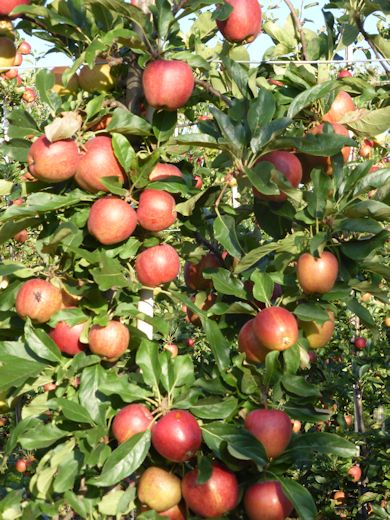 This particular Gala Club meeting marked the last of Harry Wooldridge's tenure as Chairman. Harry has been the driving force behind Gala's rise to the top of the English apple tree. His ability to cajole the captains of our apple industry into committing support for Gala promotion, cannot be underestimated and we should all be grateful for his jovial enthusiasm.
This particular Gala Club meeting marked the last of Harry Wooldridge's tenure as Chairman. Harry has been the driving force behind Gala's rise to the top of the English apple tree. His ability to cajole the captains of our apple industry into committing support for Gala promotion, cannot be underestimated and we should all be grateful for his jovial enthusiasm.
Succeeding Harry as Chairman will be Peter Checkley from Broadwater Farm an equally enthusiastic fruit grower, who will continue to drive the Gala Club onward in the years ahead.
Today Gala is easily the 'number one' English grown apple; taking over from Cox in 2011, it is also the number one selling apple in the UK, with circa 27% of all apple sales.
Consumers have voted it No 1 by buying it in such volumes. Growers love it because it has the ability to crop 'year on year' even overcoming the atrocious weather last winter and delivering another good crop this year.
Adrian Scripps Ltd. Parsonage Farm, Cobham, Kent.
James Simpson MD of Adrian Scripps Ltd welcomed Gala Club members to Parsonage Farm, introducing key members of the Scripps management team; Mark Holden - Orchard Production Manager, Russell Graydon - Senior Farms Manager and Radu Andrescu farm manager at Parsonage Farm.
James said Adrian Scripps Ltd now farms 750 hectares and is one of the UK's largest fruit growers, growing more than 320 hectares of apples, pears and blackcurrants on five farms in Kent. The head office and centralised storage and packing complex is located at Moat Farm in Five Oak Green near Tonbridge.
Key to Adrian Scripps Ltd success over the last five decades is the uniform management system operated across all the five farms. Adrian Scripps Ltd farms on a large scale, but by keeping management practices 'standard' to all farms large scale efficiencies are achieved. Parsonage Farm was bought by Adrian Scripps in 1992 and the first Gala planted that year. Further planting of Gala, Braeburn and Kanzi has taken place with the gradual removal of Cox in favour of the higher yielding Gala and Braeburn.
James Simpson, then passed the role of host/guide to Mark Holden who has been involved in many aspects of the growth of Adrian Scripps Ltd over the last two decades.
The first Gala trees were planted at Parsonage in 1992 by Mark Holden and the farm has developed over the last 22 years with plantings of more Gala, Braeburn and Kanzi. The original Gala clone planted at Parsonage was Mondial, planted at 1.5 metres apart in the row with rows 4 metres apart and trees around 2 metres tall. Recent plantings (2010) are spaced at 3.5 metre row spacing x 1 metre in the rows and 3 metres high amounting to 3,000 trees per hectare.
Mark told us pollination is aided by Malus pollinators; a change from the early years when a dessert apple was favoured, but the problem of harvesting pollinators 'dotted' throughout the orchards proved costly and Mark 'pulled them out' and replaced them all with Malus.
The original Gala clone was Mondial (at that time the most prolific clone) and although some Gala Anaglow have been planted, the more recent plantings are Galaxie Gala.
Parsonage Farm is also home to the Horticultural Development Company (HDC) Fruit Wall trials.
Yield potential:
Mark Holden anticipates Gala yields of circa 40 tonnes per hectare this season. This involves picking 350 - 400 bins (100 - 120 tonnes) of Gala a day on each of four of the company's five farms, and transporting the bins back to the central storage complex at Moat Farm. Mark indicated that Braeburn (due to the larger size fruit profile) will pick 500 - 600 bins (150 - 180 tonnes) daily on each of the four farms.
Picking is a large scale logistical operation and all the Gala will be picked in the space of two weeks. All Gala (and Braeburn) is picked as a 'one pick' operation to keep the harvest as simple as possible. Most growers will pick over Gala 'twice' but Mark Holden said this is impractical for such a large area of orchards on multiple sites. To enable the 'one pick' all orchards are thinned twice, once to achieve good fruit size by reducing fruit numbers early in the season and a second thinning in July/August with the aim of removing any sub standard fruit. e.g. small fruit, scab, skin russet, pest damage.
Mark said they spend far more on thinning than on pruning. The benefits are grade-outs of 88 - 92% 'Supermarket' Class 1 standard off the grader.
Questions
Answering a question on site suitability, Mark said the farm is 80 metres above sea level and needs no artificial drainage with brickearth soil throughout and the bulk of the farm is South East facing; 'just about a perfect site' for dessert apple production.
Another questioner asked about the use of a 3 row sprayer. Mark said Scripps have one at their Wenderton Farm in East Kent and anticipate buying another one. "Scab is not usually a problem at Parsonage due to the good air movement.
Below: English Gala has been THE success story of the last fifteen years

Below left: Mark Holden - Adrian Scripps Production Manager stands infront of the Gala orchard he planted in 1992 - Below right: the sister Gala orchard at Parsonage also planted by Mark in 1993
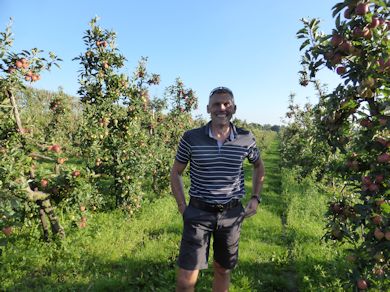
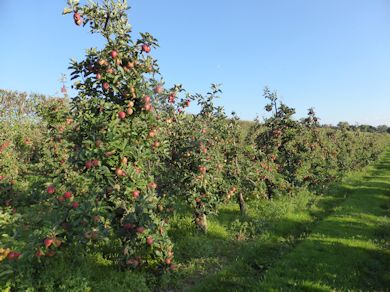
Below: Today the format for a modern tree system is 'a narrow wall of fruit extending higher than we have seen in the past'
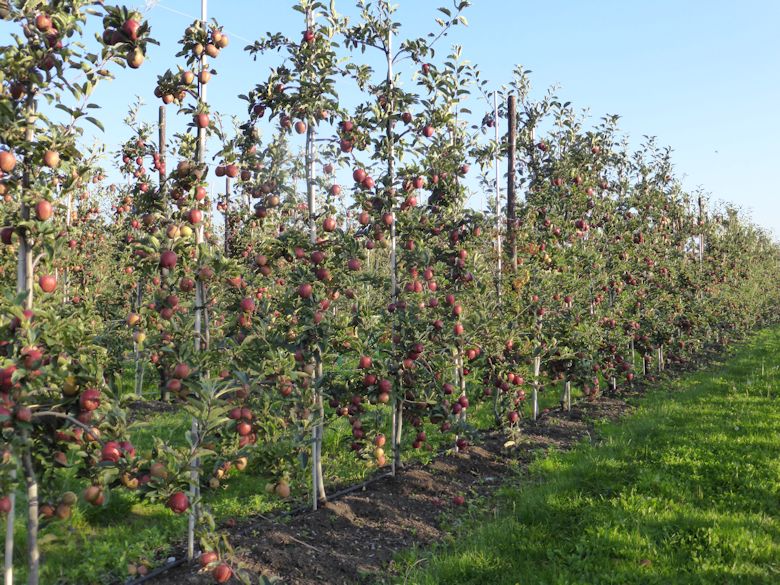
Below left: Gala is suffering from more skin russet this year - Below right: this Gala has a high level of russet
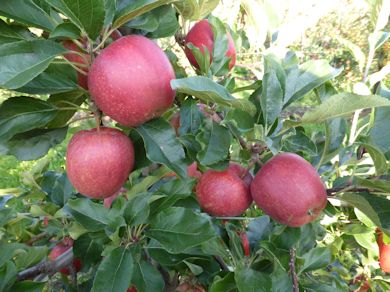
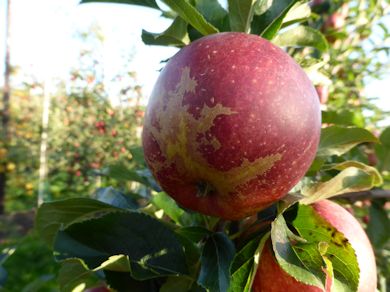
The debate over why skin russet is more prevalent this season, sways between cold weather early in the fruitet stage or physical damage from sprays early on when the fruitlet is vulnerable. My good friend Roger Worraker comments that while some orchards have more than acceptable levels of skin russet, others are 'squeaky clean' suggesting the reason may be a tank mix of more than one chemical early in the season. This may be due to combining a fungicide with an insecticide (common practice).
Click to view Adrian Scripps Ltd website for a more detailed overview.
After the walk around Parsonage Farm we moved to the local village hall for a 'buffet supper' and 'presentations' from invited speakers.
Mark Tully from Landseer updated growers on the use of Smartfresh in advanced storage systems. Smartfresh is a simple hydrocarbon molecule similar to naturally occurring ethylene. This similarity allows SmartFresh to interact with the ethylene receptors of the fruits slowing the ripening process and improving the longevity and quality of the apples in store.
 Simon Townsend from BASF updated growers on the new developments in pesticides and in particular use of Nematodes in controlling Codling Moth. The benefit of Nemasys C is control of the pest without the risk of any residues. 'This is the way forward in pest control' and more Nematode products are coming forward.
Simon Townsend from BASF updated growers on the new developments in pesticides and in particular use of Nematodes in controlling Codling Moth. The benefit of Nemasys C is control of the pest without the risk of any residues. 'This is the way forward in pest control' and more Nematode products are coming forward.
Dr. Martin Luton from Worldwide Fruit/Qualytech updated growers on the maturity testing carried out by The Quality Fruit Group. Martin told growers that the maturity characteristics in 2014 are similar to 2011. He also emphasised the QFG maturity testing is only a guide and ALL growers should test their own orchards for maturity status. This involves taking a representative sample and assessing: 'background colour' (levels of green) starch levels (using potassium iodine) sugar levels and fruit firmness (pressures)
Adrian Barlow - CEO of English Apples & Pears updated growers on the latest crop data across the Northern Hemisphere and in particular the projected UK Gala crop and the influence of Gala grown in Europe on the marketplace during the 2014/15 season.
Adrian refreshed our memories with all Gala data showing a share of the market in 1991 of 4% which increased to 27.5% in 2010/2011. In 2013/14 English Gala sales in UK Supermarkets reached 32,000 tonnes. The forecast for a 49.000 tonne crop (total yield) this season (up 24%) may fall a bit short due to more russet and scab this year. By comparison the EU crop forecast is 1.3 million tonnes (+ 7% on 2013)
The Russian ban has caused concern with EU exports to Russia of 900,000 tonnes in 2013 of which 700,000 was grown in Poland. The probability is of intervention in Europe primarily benefiting Poland to balance yields and demand.
Supermarket share of the English Gala market.
Tesco - 37.8 % - Sainsburys - 28% - Waitrose - 5.3% - Morrissons - 11.9% - Asda - 9% .
Based on share of the grocery market, Sainsburys 'punches well above its weight' and Waitrose 5.3% compares with a 4% share of the grocery market.
Below left: Harry Wooldridge receives a gift from Roger Worraker on behalf of Gala Club members in recognition of his service to the English Gala industry. Below right: Roger, Harry and Peter Checkley the new Gala Club Chairman
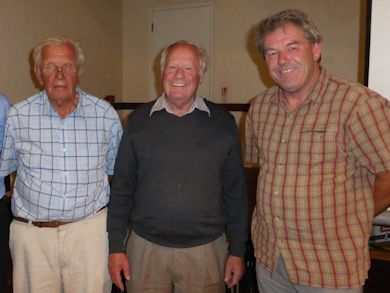
The success of Gala continues unabated; Gala has without been doubt the Star of the English Apple revival. It was less than 20 years ago when our apple industry was 'on its knees' and the future looked grim. Thanks to the adoption of modern varieties, of which Gala was the 'first of the new kids on the block we now have an upsurge in English Apple Production!
But every so often, someone tries to 'upset the apple cart'
Flicking through the 'internet' I came across one of the misguided views of Gala propogated by a Journalist who I am sure was sincere in her belief, but totally misguided in my view.
The English Apple Man deplores the enthusiasm of the 'media knockers' as they degrade the efforts of professional apple growers, who have over the last 10 - 15 years transformed the English apple industry from an ailing position dependent on the varieties championed by the 'media moaners' into a vibrant industry with increasing investment in new orchards, modern packing facilities and 'state of the art storage. The adoption of varieties like Gala and Braeburn has enabled the extension of the English 'dessert' apple season into June and all at the expense of imported apples as UK Supermarkets recognise the value of 'home grown' and support English apples ahead of imported apples; albeit, not at the expense of quality!
An example of the 'media knockers' who champion the English varieties of old; most of which arrived from other countries in 'centuries past' and ALL of which trace their genes back to the fruit forests of Tein Shan in Asia, is embodied in an article by Karen Homer in The Guardian in March 2011 who railed against what she called: Gala, a New Zealand import beloved of the supermarkets for its saccharine sweetness, its evenness of skin-tone and its homogeneity of flavour.
The lady added: Keats described the glorious abundance of our native land in his ode To Autumn. "I suspect the apples that weighed heavy on the boughs of the "moss'd cottage trees" were a trusty old English variety - if not the lyrically named Beauty of Bath or Yorkshire Goosesauce then certainly a Cox's Orange Pippin. Not, it is safe to assume, the overly sweet juice bomb otherwise known as the Gala, which if it earned frequent-flyer miles would surely accrue plenty to bypass the mouth of some greedy pom and get straight back on the first plane home".
Note: Yorkshire Goosesauce is a synonym for Yorkshire Greening.
The English Apple Man noted one of the first 'BLOG' comments responding to Karen Homer's article, which asked:
"Do you have any evidence that these are the reasons that consumers are buying more of them (and hence supermarkets selling them)?
Or is this just an excuse to get "cross" at the evil capitalism of "Big Apple"?
Interestingly: and this is factual; Gala is not naturally high in sugar, it is the lack of acidity which attracts many of the younger consumers. It is also one of the best apples for attracting children in the Fruit for Schools programme into eating apples, not due to the perceived sugars, but due to the 'forgiving texture' and by that I mean the small children's teeth cope with the texture, I don't mean: and I quote from Karen Homer's article - "As far as texture is concerned, we seem happy to settle for floury cotton-wool innards so long as the apple's uniform skin is waxily smooth and blemish-free".
The English Apple Man's position is; why cannot we all work together to enlarge the 'apple cake' instead of undermining the efforts of our growers by maligning the very apples which are winning back consumers to 'English grown apples' it is Gala, Braeburn, Jazz, Rubens, Kanzi, Cameo, Zari, Estivale, and soon Envy and Smitten (all of which originate from other countries but grow superbly in our climate) which will be the saviour of English Apple growers. There will still be a place for Worcester Pearmain, Early Windsor, Spartan and Egremont Russet and where possible Heritage/Traditional varieties will be part of the mix.
Currently 80% of English grown apples are sold in our Supermarkets and we cannot as an industry afford to lose volume, however we can still make available the heritage varieties via farm shops, and farmers markets. Let us rejoice the success of our English growers, whether it be English Gala, Braeburn, Cox et al in Supermarkets or Adams Pearmain, Ashmeads Kernel, Devonshire Quarrenden, Blenheim Orange, Charles Ross and others in farm shops and farmers markets.
My thanks however to Karen Homer for drawing my attention to Keats Poem!
Season of mists and mellow fruitfulness!
Close bosom-friend of the maturing sun;
Conspiring with him how to load and bless
With fruit the vines that round the thatch-eaves run;
To bend with apples the mossed cottage-trees,
And fill all fruit with ripeness to the core;
To swell the gourd, and plump the hazel shells
With a sweet kernel; to set budding more,
And still more, later flowers for the bees,
Until they think warm days will never cease,
For Summer has o'erbrimmed their clammy cells.
Who hath not seen thee oft amid thy store?
Sometimes whoever seeks abroad may find
Thee sitting careless on a granary floor,
Thy hair soft-lifted by the winnowing wind;
Or on a half-reaped furrow sound asleep,
Drowsed with the fume of poppies, while thy hook
Spares the next swath and all its twined flowers;
And sometimes like a gleaner thou dost keep
Steady thy laden head across a brook;
Or by a cider-press, with patient look,
Thou watchest the last oozings, hours by hours.
Where are the songs of Spring? Ay, where are they?
Think not of them, thou hast thy music too, -
While barred clouds bloom the soft-dying day
And touch the stubble-plains with rosy hue;
Then in a wailful choir the small gnats mourn
Among the river sallows, borne aloft
Or sinking as the light wind lives or dies;
And full-grown lambs loud bleat from hilly bourn;
Hedge-crickets sing, and now with treble soft
The redbreast whistles from a garden-croft;
And gathering swallows twitter in the skies.
On that rather splendid appraisal of late summer drifting into Autumn, I say goodbye until next week.......
Take care
The English Apple Man